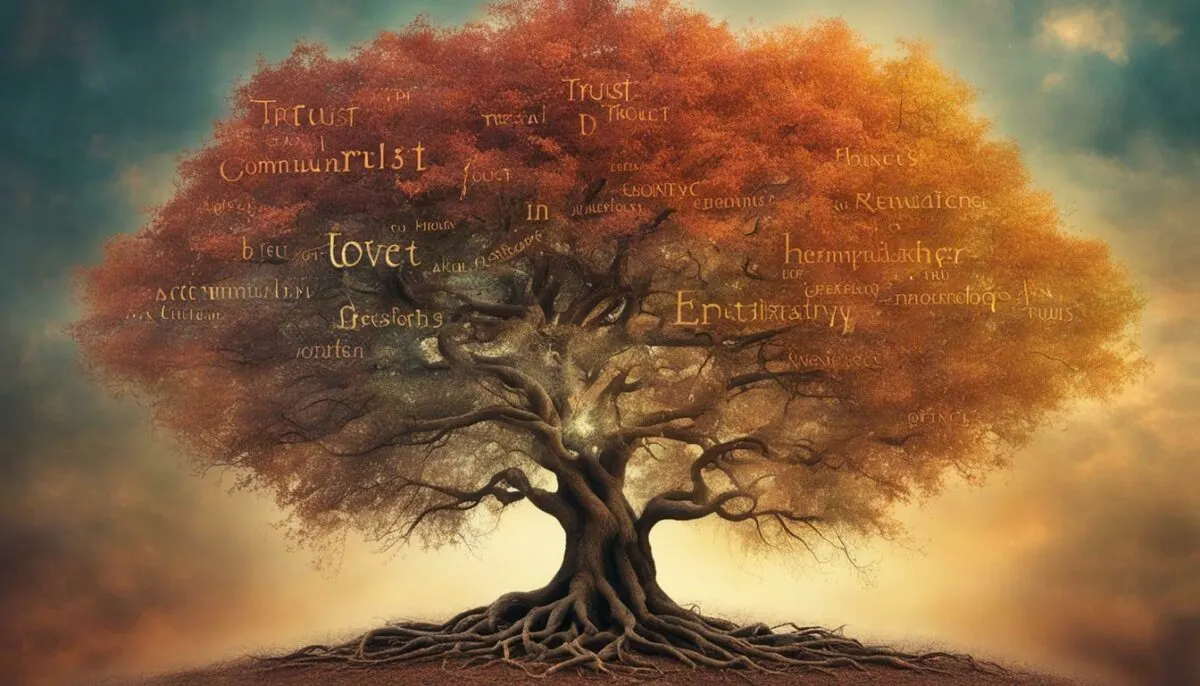Communication plays a crucial role in maintaining healthy and fulfilling relationships. Without communication, there is no relationship, and without respect and trust, love cannot exist. Effective communication involves active listening, understanding different communication styles, and finding ways to fulfill the needs of your partner. Good communication can help handle conflicts and strengthen partnerships.
Communication is the foundation of any successful relationship. It is important to be aware of the four facets of communication: fact, self-revealing, relationship, and appeal. These facets encompass the essential elements of effective communication, allowing individuals to express themselves authentically and connect on a deeper level.
Listening is a crucial communication skill. Active listening involves nonverbal involvement, paying attention, avoiding judgment, and tolerating silence. By actively listening, we can truly understand our partner’s thoughts, feelings, and needs, and create a safe space for open and honest communication.
Nonviolent communication, based on non-judgmental perception, can improve personal communication in relationships. It involves expressing observations without interpretation, communicating feelings without thoughts, expressing needs without strategies, and making clear, non-demanding requests. By practicing these communication techniques, relationships can be strengthened and conflicts can be resolved more effectively.
Key Takeaways:
- Communication is essential for maintaining healthy relationships.
- Active listening promotes understanding and empathy in communication.
- The four facets of communication provide a framework for effective expression.
- Nonviolent communication fosters harmonious dialogue and resolution of conflicts.
- Practicing effective communication techniques can strengthen relationships and create a deeper connection.
The Importance of Communication in Relationships
Effective communication is essential for building and nurturing strong relationships, as it fosters understanding, trust, and emotional connection between couples. By expressing thoughts, feelings, and needs openly and honestly, partners can develop a deeper level of intimacy and create a solid foundation for their relationship to thrive.
Communication plays a vital role in resolving conflicts and preventing misunderstandings. Through open and respectful dialogue, couples can address issues, express their concerns, and work together to find mutually beneficial solutions. It enables them to navigate challenges, strengthen their bond, and maintain a harmonious connection.

“Communication is the lifeline of any relationship. It is the key that unlocks love, trust, and understanding.” – Unknown
Furthermore, effective communication allows couples to actively listen to one another. It involves not just hearing words, but also understanding the underlying emotions, needs, and desires. Active listening creates a safe space for partners to be vulnerable, feel heard, and validate each other’s experiences. It builds empathy and strengthens the emotional connection, fostering a deeper sense of intimacy in the relationship.
H3: The Role of Communication in Building Trust
Communication is closely intertwined with trust in relationships. Open and honest communication promotes transparency and authenticity, which are crucial elements in establishing trust. Through effective communication, partners can share their fears, insecurities, and past experiences, allowing them to develop a deeper understanding and acceptance of one another.
In summary, cultivating effective communication within a relationship is vital for its growth and longevity. It enhances understanding, fosters trust, and strengthens the emotional connection between partners. By actively listening, expressing thoughts and feelings honestly, and practicing open and respectful dialogue, couples can nurture their relationship and create a solid foundation for a fulfilling and lasting partnership.
Effective Communication in Love
Love thrives on open and effective communication, and these quotes capture the essence of how communication plays a pivotal role in maintaining a healthy and loving relationship. When it comes to love, communication is the key that unlocks understanding, trust, and connection between partners. By expressing our thoughts, emotions, and needs, we create a pathway for deeper intimacy and mutual growth.
“In true love, there is no room for assumptions. Speak your heart and listen with compassion.” – Unknown
In the journey of love, effective communication acts as a bridge that helps to traverse challenges and celebrate successes together. By being open and honest in our conversations, we create an environment of safety and vulnerability that allows love to flourish.
“The most precious gift we can offer others is our presence. When mindfulness embraces those we love, they will bloom like flowers.” – Thich Nhat Hanh
These quotes remind us of the importance of active listening and being fully present with our loved ones. By practicing active listening, we demonstrate our respect and care for their thoughts and emotions. This active engagement fosters deeper understanding and strengthens the connection between partners.
Table: The Four Facets of Communication
| Facet | Description |
|---|---|
| Fact | Sharing objective information and facts. |
| Self-revealing | Sharing personal thoughts and emotions. |
| Relationship | Building and maintaining rapport and connection. |
| Appeal | Expressing desires, needs, and making requests. |
This table outlines the four facets of communication, and understanding and utilizing them can enhance the effectiveness of our communication in love. By nurturing these facets, we can create an atmosphere where both partners feel heard, valued, and supported.

By embracing effective communication in love, we can build stronger foundations for our relationships. It allows us to navigate challenging times with empathy, resolve conflicts with understanding, and cherish the beautiful moments that love brings. Let these quotes and insights be a gentle reminder of the power of communication in fostering love and connection.
The Consequences of Lack of Communication in Relationships
When communication becomes scarce, relationships suffer, and these quotes serve as a reminder of the consequences that come with a lack of communication. In relationships where communication is lacking, misunderstandings can breed resentment, trust can erode, and emotional disconnect can take hold. Without open and honest communication, issues go unresolved, leading to a buildup of frustration and dissatisfaction.
“In the absence of communication, silence speaks; in the absence of love, actions speak.” – John C. Maxwell
A lack of communication can lead to a breakdown in emotional intimacy. Partners may feel neglected, unheard, or unimportant when their thoughts and feelings are not acknowledged or validated. This can create a sense of distance and loneliness, as both parties may struggle to understand each other’s needs and desires.
Furthermore, a lack of communication often results in unresolved conflicts. Without effective communication, disagreements can escalate into heated arguments or simmer beneath the surface, causing long-lasting tension. Resentment and bitterness can build over time, weakening the foundation of the relationship and making it difficult to find common ground.

| Consequence | Impact |
|---|---|
| Emotional Distance | Leads to a sense of loneliness and disconnection. |
| Unresolved Conflicts | Causes tension and resentment to build over time. |
| Breakdown of Trust | Diminishes trust and creates doubts about the relationship. |
| Stagnant Growth | Hampers personal and relationship growth. |
To prevent the consequences of a lack of communication, it is crucial to prioritize open and honest dialogue with your partner. Take the time to listen actively, express your thoughts and emotions, and be willing to compromise. Remember, communication is a continuous process that requires effort and intentionality, but the rewards of a strong and connected relationship are well worth it.
Communication and Trust in Relationships
Trust is the foundation of any healthy relationship, and these quotes emphasize how communication plays a vital role in fostering trust between partners. Effective communication allows individuals to express their thoughts, feelings, and needs openly, creating an environment of understanding and empathy. When partners actively listen to each other, respect their boundaries, and communicate honestly, trust is nurtured and strengthened.
“Communication is the lifeline of relationships. Without it, all hope for a strong bond fades away.” – Unknown
Open and honest communication builds a sense of security and reliability within a relationship. When couples feel comfortable expressing themselves and know they will be heard and understood, trust flourishes. By discussing their fears, aspirations, and vulnerabilities, partners cultivate a deeper emotional connection, fostering trust and intimacy.
Furthermore, effective communication in relationships involves more than just words; nonverbal cues, such as body language and tone of voice, also contribute to building trust. Through active listening and observing nonverbal signals, partners can better understand each other’s needs and emotions, creating a stronger bond based on empathy and mutual respect.
The Role of Active Listening in Building Trust
Active listening is a fundamental aspect of effective communication and plays a pivotal role in building trust between partners. It involves giving your full attention to your partner, showing genuine interest, and withholding judgment. By being present and actively engaged in the conversation, you communicate that you value and respect your partner’s perspective, fostering a sense of trust and safety within the relationship.
“Listening is an art that builds trust. It is the gateway to understanding, empathy, and stronger connections.” – Unknown
Active listening requires patience, compassion, and the ability to tolerate silence. It means truly hearing your partner’s words, thoughts, and emotions, rather than simply waiting for your turn to speak. Through active listening, partners can establish a deep sense of trust, as they feel heard, validated, and supported by each other.
By prioritizing effective communication and actively practicing active listening, couples can create a solid foundation of trust and strengthen their relationship. Trust and communication go hand in hand, forming the pillars that support love, understanding, and long-lasting partnerships.

Open communication is key to creating a strong and lasting bond, and these quotes encapsulate the power of honest and open dialogue in relationships. When partners are able to express their thoughts, feelings, and needs openly, it fosters understanding, trust, and emotional connection. By embracing open communication, couples can navigate challenges and build deeper intimacy.
“In a relationship, honesty and transparency are like the pillars that hold it together. Without open communication, those pillars crumble, and the relationship becomes fragile.” – Unknown
Effective communication is not just about speaking your mind; it also involves active listening and truly hearing what your partner has to say. It requires empathy, patience, and a willingness to understand their perspective. When both partners actively engage in open communication, they create an environment where each person feels heard and valued.
- Active listening involves truly focusing on your partner’s words, nonverbal cues, and emotions without interruption or judgment. It shows that you value their thoughts and feelings.
- Nonviolent communication, also known as compassionate communication, is a powerful tool for resolving conflicts and deepening connection. It emphasizes empathy, understanding, and expressing needs without blame or criticism.
By practicing open communication techniques like active listening and nonviolent communication, couples can strengthen their relationships and create a safe space for vulnerability and growth. Open communication allows for the expression of desires, expectations, and concerns, leading to a greater understanding of each other’s needs. It lays the foundation for healthy problem-solving, mutual support, and a love that thrives on open and honest dialogue.

| Benefits of Open Communication in Relationships |
|---|
| 1. Increased trust and intimacy |
| 2. Effective conflict resolution |
| 3. Emotional connection and understanding |
| 4. Mutual growth and personal development |
Communication in Marriage
Marriage requires constant communication, and these quotes shed light on the essential role it plays in building a strong and resilient marital bond. Communication in marriage is the foundation that sustains the relationship, allowing couples to connect, understand, and support each other. It is through effective communication that partners can express their needs, desires, and concerns, fostering a deeper level of intimacy and trust.
As the renowned poet Kahlil Gibran once said, “Let there be spaces in your togetherness, and let the winds of the heavens dance between you. Love one another but make not a bond of love: let it rather be a moving sea between the shores of your souls.” This quote beautifully encapsulates the idea that communication in marriage should allow for individual growth and independence while still nurturing the connection between partners.
Another insightful quote by American author Leo Buscaglia reminds us that “Communication is a continual balancing act, juggling the conflicting needs for intimacy and independence.” This quote emphasizes the importance of finding a balance between sharing one’s thoughts and feelings while respecting each other’s personal boundaries. It highlights the need for open and honest communication that supports both emotional closeness and individual growth within the marriage.
Communication in marriage is not just about words spoken, but also about active listening, understanding, and empathizing with each other’s perspectives. It is about creating a safe and supportive environment where both partners feel heard, validated, and respected.

| Quotes on Communication in Marriage |
|---|
| “A great marriage is not when the ‘perfect couple’ comes together. It is when an imperfect couple learns to enjoy their differences.” – Dave Meurer |
| “The real act of marriage takes place in the heart, not in the ballroom or church or synagogue. It’s a choice you make – not just on your wedding day, but over and over again.” – Barbara De Angelis |
| “In marriage, the little things are the big things. It is never being too old to hold hands. It is remembering to say ‘I love you’ at least once a day.” – Unknown |
Effective Communication in Marriage
Effective communication in marriage involves more than just talking; it requires active listening, empathy, and understanding. It means being fully present and engaged when your partner is speaking, listening not just to respond but to truly comprehend their thoughts and feelings. By practicing effective communication techniques, such as using “I” statements, expressing appreciation, and seeking clarification when needed, couples can strengthen their bond and navigate challenges together.
Remember, communication in marriage is an ongoing process. It requires patience, willingness to learn, and a commitment to nurturing the connection between partners. By prioritizing open and honest communication, couples can build a strong foundation of trust, understanding, and love that will support them throughout their journey together.
The Four Facets of Communication
Understanding the four facets of communication—fact, self-revealing, relationship, and appeal—is key to developing strong interpersonal connections. Each facet plays a unique role in conveying messages and establishing mutual understanding in relationships.
The first facet, fact, focuses on sharing information and stating objective truths. It involves communicating facts and figures, providing clear and concise details, and avoiding exaggeration or personal interpretations. Effective fact-based communication helps establish a solid foundation of shared knowledge and understanding.
The second facet, self-revealing, involves expressing one’s thoughts, feelings, and personal experiences. It encourages open and honest communication, enabling individuals to share their emotions, vulnerabilities, and perspectives. Self-revealing communication fosters empathy and deepens emotional connections in relationships.
The third facet, relationship, emphasizes the dynamics and quality of the connection between individuals. It involves understanding and addressing the needs, desires, and values of both parties. Relationship-based communication helps build trust, respect, and mutual support, strengthening the bond between partners.
The fourth facet, appeal, focuses on influence and persuasion within a relationship. It involves making requests, suggestions, or presenting arguments in a respectful and considerate manner. Appeal-based communication respects the autonomy and agency of both parties, fostering compromise and constructive problem-solving.

Each facet of communication is interconnected and necessary for effective interpersonal relationships. By understanding and utilizing these facets, individuals can navigate conversations with clarity, empathy, and the ability to foster deeper connections.
The Art of Active Listening
Active listening is a fundamental aspect of effective communication, and by mastering the art of active listening, we can foster deeper connections and understanding in our relationships. When we actively listen, we show genuine interest and make a conscious effort to comprehend not just the words being said, but also the underlying emotions and intentions behind them.
One essential element of active listening is nonverbal involvement, which includes maintaining eye contact, nodding, and using facial expressions to convey empathy and understanding. These nonverbal cues reassure the speaker that their message is being received attentively, creating a safe space for them to express themselves.
Another crucial aspect of active listening is avoiding judgment. Instead of jumping to conclusions or formulating responses while the other person is speaking, active listeners suspend judgment and strive to truly grasp the speaker’s perspective. This allows for open-minded and non-defensive dialogue, fostering trust within the relationship.
Tolerating silence is also an important skill in active listening. Allowing moments of silence demonstrates respect for the speaker’s thought process and gives them the space they need to articulate their thoughts fully. In these moments, active listeners resist the urge to fill the silence and instead prioritize understanding over immediate response. By practicing these active listening techniques, we can create a foundation of strong communication and build healthier, more fulfilling relationships.

| Active Listening in Relationships |
|---|
| “Listening is an art that requires more than just hearing words; it involves understanding and empathizing with the emotions behind them.” |
| “When we actively listen, we show our loved ones that we value their thoughts, feelings, and experiences. This strengthens our bond and fosters deeper intimacy.” |
| “Active listening is not about waiting for your turn to speak; it’s about truly hearing and connecting with your partner’s words. It’s a gift we can give to one another.” |
Nonviolent Communication in Relationships
Nonviolent communication offers a compassionate approach to resolving conflicts and fostering healthy communication in relationships, as it encourages understanding, empathy, and clarity in our interactions. This form of communication enables partners to express themselves without judgment or criticism, creating an environment of trust and mutual respect. By embracing nonviolent communication, couples can navigate disagreements and challenges with empathy, seeking understanding rather than engaging in power struggles.
One key aspect of nonviolent communication is the emphasis on active listening. It involves being fully present and attentive to your partner, allowing them to express their thoughts and feelings without interruption. Active listening entails not just hearing the words being spoken, but also understanding the emotions and needs behind them. By practicing active listening, couples can cultivate a deeper understanding of one another, fostering a stronger connection and preventing misunderstandings.
“Communication is not just about talking, but also about listening. Listening with an open heart and mind is the foundation of a healthy relationship.” – Unknown
Nonviolent communication also encourages individuals to express themselves authentically, using “I” statements to communicate their needs and feelings. By focusing on personal experiences and emotions, rather than blaming or accusing their partner, individuals can foster a safe space for open and honest communication. This approach promotes vulnerability and fosters a sense of emotional safety within the relationship, allowing both partners to express themselves freely and work collaboratively towards resolution.
By implementing nonviolent communication techniques, couples can build stronger relationships based on trust, empathy, and understanding. It provides a framework for resolving conflicts peacefully, promoting mutual growth, and deepening emotional intimacy. Through nonviolent communication, couples can create an environment where both partners feel heard, valued, and supported.

| Key Principles of Nonviolent Communication | Benefits |
|---|---|
|
|
Strengthening Relationships Through Effective Communication
By prioritizing effective communication and implementing proven strategies, we can nurture stronger bonds, resolve conflicts, and build healthier relationships. Communication is the foundation of any successful partnership, and by honing our skills and adopting an open and empathetic approach, we can foster deeper connections with our loved ones.
Understanding the four facets of communication – fact, self-revealing, relationship, and appeal – is key to effective dialogue. Each facet plays a crucial role in conveying information, expressing emotions, establishing rapport, and persuading others. By being mindful of these facets, we can tailor our communication style to meet the specific needs of our partners, creating an environment of trust and understanding.
The Art of Active Listening
Active listening is a fundamental aspect of effective communication. It involves giving our undivided attention to our partner, both verbally and nonverbally. By truly listening to their words, observing their body language, and validating their emotions, we make them feel heard and valued. Active listening also means avoiding judgment and tolerating silence, allowing space for our partner to express themselves fully. Through active listening, we forge a deeper connection and create a safe space for honest and open communication.

Nonviolent communication is another powerful tool for enhancing personal communication in relationships. This approach emphasizes empathy, understanding, and non-judgmental perception. It encourages us to express observations without interpretation, communicate feelings without thoughts, express needs without strategies, and make clear, non-demanding requests. By embracing nonviolent communication, we can break down barriers, resolve conflicts peacefully, and foster a greater sense of harmony within our relationships.
In conclusion, effective communication is essential in building and nurturing strong relationships. By understanding the importance of active listening, adopting nonviolent communication techniques, and being mindful of the four facets of communication, we can create an environment where trust, respect, and love flourish. By prioritizing communication and making a conscious effort to improve our skills, we can pave the way for healthier, more fulfilling connections with our partners.
Resolving Conflicts Through Communication
Conflicts are inevitable in relationships, but through open and respectful communication, we can navigate and resolve them, fostering growth and understanding along the way. Communication is the key to addressing and resolving conflicts in a healthy and constructive manner, allowing both partners to feel heard, valued, and understood.
One effective strategy for resolving conflicts is active listening. This involves giving your full attention to your partner, both verbally and nonverbally, and seeking to understand their perspective without judgment. Active listening allows for open and honest dialogue, creating a safe space for both partners to express their needs, concerns, and emotions.
Another important aspect of resolving conflicts through communication is finding common ground and compromise. By actively engaging in a two-way conversation, both partners can work together to find solutions that meet the needs of both individuals and the relationship as a whole. This collaborative approach fosters understanding and strengthens the bond between partners.
| Benefits of Resolving Conflicts Through Communication: |
|---|
| 1. Enhances mutual understanding and empathy |
| 2. Builds trust and strengthens the relationship |
| 3. Promotes personal growth and self-reflection |
| 4. Prevents resentment and fosters forgiveness |
| 5. Improves overall relationship satisfaction |

“In the midst of conflict, communication is the bridge that connects understanding and resolution.” – Unknown
Conclusion
Effective communication serves as the lifeline of any relationship, forming the foundation for love, trust, understanding, and growth. By embracing open and honest communication, we can cultivate stronger connections and build thriving relationships based on mutual respect and emotional intimacy.
Factual data confirms that communication is vital in maintaining healthy and fulfilling relationships. Without communication, there is no relationship, and without respect and trust, love cannot exist. Effective communication involves active listening, understanding different communication styles, and finding ways to fulfill the needs of your partner. Good communication can help handle conflicts and strengthen partnerships.
It is important to be aware of the four facets of communication: fact, self-revealing, relationship, and appeal. These facets provide insights into the different aspects of effective communication. Listening is a crucial communication skill, and active listening involves nonverbal involvement, paying attention, avoiding judgment, and tolerating silence.
Furthermore, nonviolent communication, based on non-judgmental perception, can significantly improve personal communication in relationships. It involves expressing observations without interpretation, communicating feelings without thoughts, expressing needs without strategies, and making clear, non-demanding requests. By practicing these communication techniques, relationships can be strengthened, and conflicts can be resolved more effectively.
In conclusion, communication plays a pivotal role in the success and fulfillment of relationships. By prioritizing effective communication, we can build stronger connections, resolve conflicts, and enhance the overall quality of our relationships. Let us remember that without communication, there can be no meaningful and lasting relationships. So, let’s embrace the power of communication and create bonds that stand the test of time.
FAQ
Q: What is the importance of communication in relationships?
A: Communication is vital in maintaining healthy and fulfilling relationships. It is the foundation on which relationships are built, and without effective communication, relationships cannot thrive.
Q: How can good communication help handle conflicts?
A: Good communication provides a platform for open and honest dialogue, which is essential for resolving conflicts in relationships. It allows both partners to express their feelings and needs, leading to a better understanding and finding resolution together.
Q: What are the four facets of communication?
A: The four facets of communication are fact, self-revealing, relationship, and appeal. Fact refers to sharing objective information, while self-revealing involves expressing personal thoughts and feelings. Relationship focuses on the dynamics between individuals, and appeal pertains to making requests and seeking understanding.
Q: What is active listening?
A: Active listening is a crucial communication skill that involves fully engaging in the conversation. It includes giving nonverbal cues, paying attention to the speaker, withholding judgment, and being comfortable with moments of silence.
Q: What is nonviolent communication?
A: Nonviolent communication is a communication style that promotes empathy and understanding. It involves expressing observations without interpretation, communicating feelings without thoughts, expressing needs without strategies, and making clear, non-demanding requests.
Q: How can effective communication strengthen relationships?
A: Effective communication fosters trust, understanding, and emotional connection between partners. It allows for better problem-solving, empathy, and support, ultimately strengthening the bond between individuals.
Q: How can communication be used to resolve conflicts?
A: Communication can be instrumental in resolving conflicts by providing a safe and open space for both partners to express their perspectives and feelings. It encourages active listening, empathy, and negotiation, leading to mutually beneficial solutions.